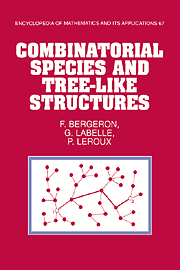Book contents
- Frontmatter
- Foreword
- Contents
- Preface
- 1 Introduction to Species of Structures
- 2 Complements on Species of Structures
- 3 Combinatorial Functional Equations
- 4 Complements on Unlabeled Enumeration
- 5 Species on Totally Ordered Sets
- Appendix 1 Group Actions and Pólya Theory
- Appendix 2 Miscellaneous Tables
- Bibliography
- Notation Indexx
- Index
Preface
Published online by Cambridge University Press: 05 May 2013
- Frontmatter
- Foreword
- Contents
- Preface
- 1 Introduction to Species of Structures
- 2 Complements on Species of Structures
- 3 Combinatorial Functional Equations
- 4 Complements on Unlabeled Enumeration
- 5 Species on Totally Ordered Sets
- Appendix 1 Group Actions and Pólya Theory
- Appendix 2 Miscellaneous Tables
- Bibliography
- Notation Indexx
- Index
Summary
During the last decades considerable progress has been made in clarifying and strengthening the foundation of enumerative combinatorics. A number of useful theories, especially to explain algebraic techniques, have emerged. We mention, among others, Möbius inversion (Rota [284], Rota–Smith [289], Rota–Sagan [288]), partitional composition (Cartier–Foata [45], Foata [106, 112]), prefabs (Bender–Goldman [11]), reduced incidence algebras (Mullin–Rota [253], Doubilet, Rota, and Stanley [80], Dür [84]), binomial posets and exponential structures (Stanley [301, 300]), Möbius categories (Content–Lemay–Leroux [66], Leroux [212, 214]), umbral calculus and Hopf algebras (Rota [286], Joni–Rota [157]), Pólya theory (Pólya [263], Redfield [275], de Bruijn [68], Robinson [282]), and species of structures (Joyal [158]). Many authors have also underlined the importance of these methods to solve problems of enumeration, in particular, Bender–Williamson [12], Berge [13], Comtet [58], Flajolet [91], Goulden–Jackson [133], Graham–Knuth–Patashnik [136], Kerber [169], Harary–Palmer [144], Knuth [172], Liu [222], Riordan [281], Moon [251], Sagan [290], Stanley [304, 302], Stanton–White [306], van Lint–Wilson [316], Wehrhahn [324], and Wilf [326].
In addition, during this same period, the subject has been greatly enriched by its interaction with theoretical computer science as a source of application and motivation. The importance of combinatorics for the analysis of algorithms and the elaboration of efficient data structures is established in the fundamental book of Knuth [172]. A good knowledge of combinatorics is now essential to the computer scientist.
- Type
- Chapter
- Information
- Combinatorial Species and Tree-like Structures , pp. xi - xxPublisher: Cambridge University PressPrint publication year: 1997

